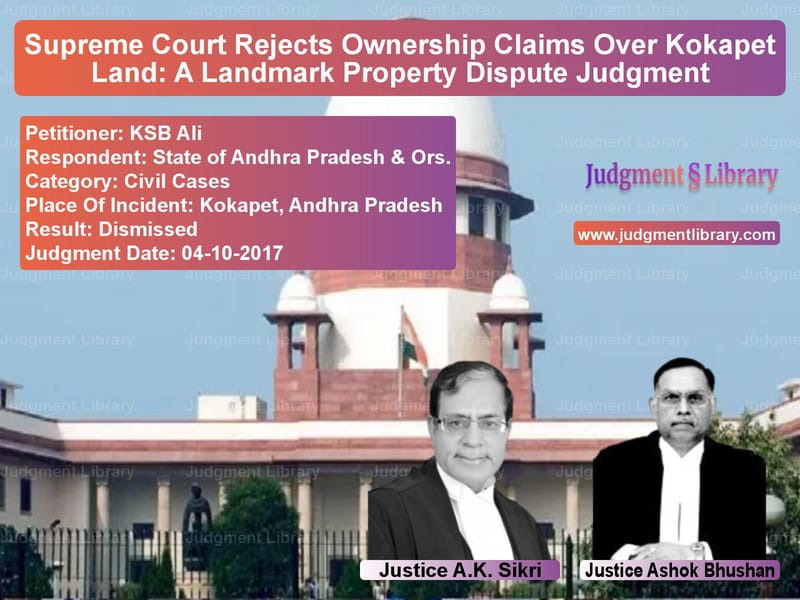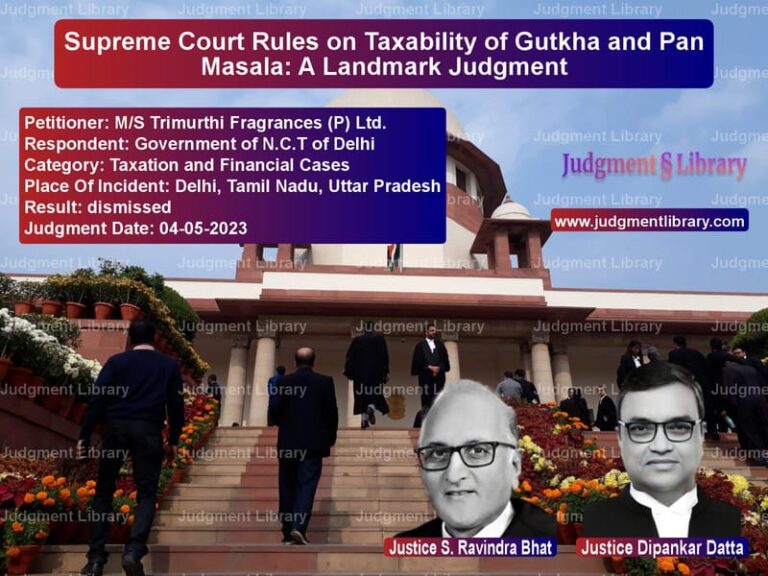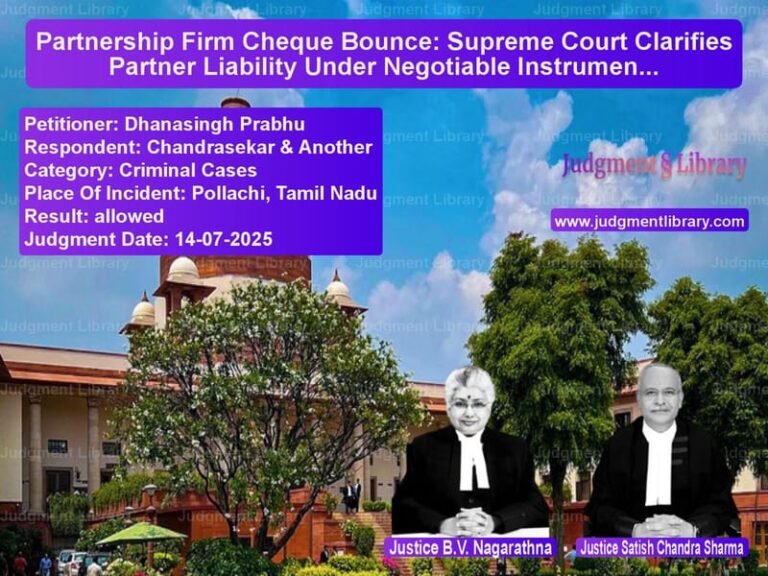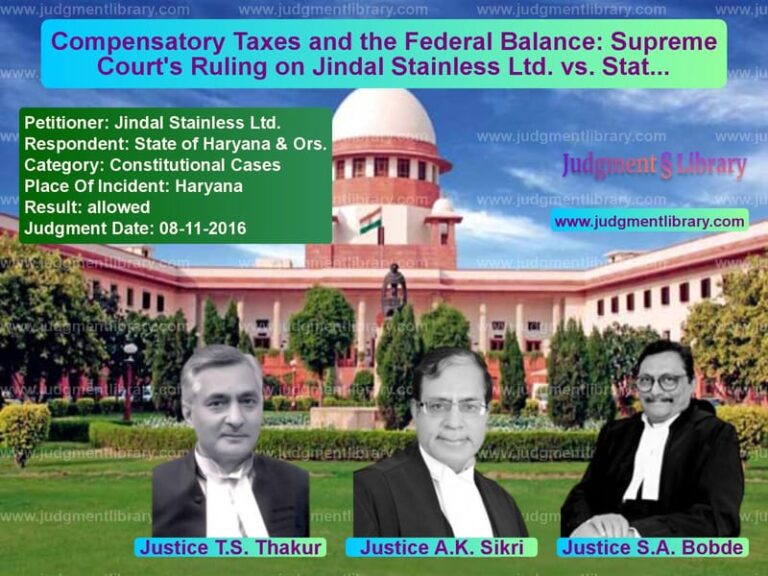Supreme Court Rejects Ownership Claims Over Kokapet Land: A Landmark Property Dispute Judgment
The long-standing dispute over the ownership of Kokapet land reached its finality with the Supreme Court’s ruling in KSB Ali vs. State of Andhra Pradesh & Ors.. The case involved complex legal questions concerning the validity of historical property claims versus the state’s authority to acquire and administer land. The judgment reinforced the principle that mere claims of hereditary succession and old documents are not enough to establish ownership unless backed by valid legal recognition.
Background of the Case
The land in question, located in Kokapet, Andhra Pradesh, was originally owned by Nawab Nusrat Jung-I, a nobleman in the princely state of Hyderabad. The dispute began when the legal heirs of the Nawab, including the petitioner KSB Ali, asserted ownership based on documents dating back to the 19th century. The claimants argued that they had inherited the land as part of their ancestral property, which was recognized under the Muntakhab issued by the Atiyat Court in 1954.
However, following the Abolition of Jagirs Regulation Act, 1949, and the subsequent land reforms introduced by the Indian government, the state of Andhra Pradesh took over the administration of large landholdings, including Kokapet. The state conducted land auctions and allotted parcels for development. This led to a legal battle between the claimants and the state government over rightful ownership.
Key Legal Issues Before the Court
- Whether the Muntakhab issued by the Atiyat Court in 1954 conferred absolute ownership rights to the petitioners.
- Whether the state of Andhra Pradesh had the legal right to take over the land under the Land Reforms Act.
- Whether the petitioners’ claim was maintainable given that previous courts had ruled against them.
- The impact of procedural lapses in various government orders that initially recognized and later rescinded the claimants’ ownership rights.
Petitioners’ Arguments
The petitioners, led by KSB Ali, contended the following:
- The Atiyat Court’s ruling of 1954 had legally recognized their ownership of the land.
- The government had earlier issued orders acknowledging their claim but arbitrarily rescinded them without due process.
- The land had never been legally acquired by the state, and no compensation was paid to the rightful owners.
- The auctioning of the land by the government was unlawful and violated their fundamental right to property.
Respondents’ Arguments
The State of Andhra Pradesh and Hyderabad Metropolitan Development Authority (HMDA) presented the following counterarguments:
- The land in question had been legally acquired by the government under the Abolition of Jagirs Regulation, 1949, and subsequent land reform laws.
- The Atiyat Court’s ruling did not grant ownership but merely recorded past arrangements.
- The claimants failed to prove uninterrupted possession or ownership under modern land laws.
- The land had been auctioned lawfully, and third-party rights had already been created.
Supreme Court’s Observations
The Supreme Court undertook a detailed examination of the historical records, government orders, and previous legal proceedings concerning the Kokapet land. The Court made the following key observations:
- The petitioners’ reliance on the Atiyat Court’s ruling was misplaced, as it did not override subsequent land acquisition laws.
- The land in question was subject to the Andhra Pradesh Land Reforms and had been lawfully taken over by the state.
- The government had acted within its jurisdiction to reclaim and auction the land for public purposes.
- The courts had consistently ruled against the claimants in earlier proceedings, and there was no new evidence to warrant reconsideration.
In its judgment, the Court stated:
“The land ownership claims based on historical records must align with the present-day legal framework. Mere reliance on outdated documents, without subsequent legal recognition, cannot form the basis of ownership claims.”
Final Judgment
The Supreme Court delivered its final verdict:
- The petitioners’ claims over the Kokapet land were dismissed.
- The government’s ownership and auctioning of the land were upheld as lawful.
- The petitioners had no further right to seek compensation or reversal of the auction.
- All pending applications related to the case were dismissed.
Conclusion
The Supreme Court’s ruling in this case sets an important precedent for land disputes involving historical claims versus state acquisition. The judgment reaffirms the principle that all property claims must conform to modern legal requirements and land governance frameworks. It also highlights the importance of clear land titles and the challenges of reclaiming land decades after its acquisition by the state.
Don’t miss out on the full details! Download the complete judgment in PDF format below and gain valuable insights instantly!
Download Judgment: KSB Ali vs State of Andhra Prad Supreme Court of India Judgment Dated 04-10-2017.pdf
Direct Downlaod Judgment: Direct downlaod this Judgment
See all petitions in Property Disputes
See all petitions in Landlord-Tenant Disputes
See all petitions in Specific Performance
See all petitions in Judgment by A.K. Sikri
See all petitions in Judgment by Ashok Bhushan
See all petitions in dismissed
See all petitions in supreme court of India judgments October 2017
See all petitions in 2017 judgments
See all posts in Civil Cases Category
See all allowed petitions in Civil Cases Category
See all Dismissed petitions in Civil Cases Category
See all partially allowed petitions in Civil Cases Category







